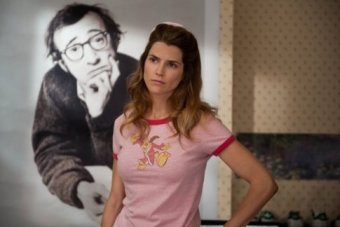Woody Allen is an auteur with a somewhat infamous tendency to shy away from the limelight–especially now more than ever in the wake of a certain accusation that just won’t go away. And so for the semi-recluse to sanction a film like Sophie Lellouche’s Paris-Manhattan is a bit out of character, making it a unique film regardless of one’s predilection for the rom-com genre.
Centered around the hyper-Woody Allen-obsessed Alice (Alice Taglioni), Lellouche’s script focuses on the problems of a woman (or any person really) who revolves her love life around the philosophy of a director as jaded as the famed Brooklynite. Her difficulty in finding a man she’s actually interested in stems, in large part, from her Allen-inspired criteria. When she actually happens upon someone she likes–Pierre (Louis-Do de Lencquesaing), a jazz player–while at a club with her sister, Hélène (Marine Delterme), her hopes of love are dashed when he seems to fall instantly in love with Hélène instead.
That night, she confers with her Woody Allen poster (as she often does), threatening to kill herself. Allen remarks, “I grew up in Brooklyn, you know. Nobody committed suicide. Everyone was too unhappy.” But of course, Alice goes on with her life, carrying out her studies to be a pharmacist while working with her father (Michel Aumont).
Two years later, her sadness over having to watch Pierre and Hélène get married makes her muse, “I wonder if life is worth living.” Allen, in poster form, responds, “It’s a very good question. There are certain things I guess that make it worthwhile.” Alice counters, “For example?” Allen lists, “Hmm, I would say, what? Groucho Marx, to name one thing. Hmm. The second movement of the Jupiter Symphony. And Louis Armstrong recording the ‘Potato Head Blues.’ Swedish movies, naturally…” Alice finally adds, “And the smile of my sister in love.” Having reconciled that her sister’s happiness is more important to her than losing a man she thought she could love, Alice tries her hand at dating–at first, with very little success.
Finally, Pierre introduces her to the recently divorced Vincent (Yannick Soulier), who seems to offer all the romantic gestures she’s looking for. And yet, after encountering another man, Victor (Patrick Bruel), at a lawyer/friend party thrown by Pierre and Hélène, Alice can’t help but feel somewhat attracted to his nihilistic views on existence–yet this is also precisely what makes her question whether or not he could ever truly fall in love the way she imagines a relationship should be.
As someone who installs security alarms for a living, Victor re-encounters Alice after she rebuffs him as a result of requesting an alarm to be put in at her pharmacy. From there, the two strike up a rapport that turns into a friendship she cherishes–especially after they bond over investigating whether or not Pierre is cheating on Hélène and discover something far more unexpected.
In spite of their obvious connection, Alice is too hung up on the idea of how a romance should be as a result of her Woody Allen movie diet, only to realize that perhaps it’s time to let go of such things–with a bit of help from the grand cynic himself.






















